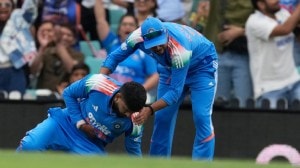Hizbul, Army meet fails to take off
Srinagar, Aug 5: A meeting between Hizbul Mujahideen (HM) commanders and Army officers at an undisclosed destination to work out ceasefire...

Srinagar, Aug 5: A meeting between Hizbul Mujahideen (HM) commanders and Army officers at an undisclosed destination to work out ceasefire modalities failed to take place today as two of the four commanders who represented HM in the first round of talks were not available.
Sources close to HM said the two had represented the outfit in the first round of talks with Union Home Secretary Kamal Pande here on Thursday.
Earlier, Fazal Haq Qureshi, mediator nominated by Hizbul Mujahideen, said the two sides were meeting today at an undisclosed destination to work out modalities for effective implementation of the ceasefire.
Asked if he will be joining the talks, Qureshi said his role ended after the first meeting between the Centre and the Hizb commanders.
“I served as a bridge between the Hizb commanders and representatives of the government”, he said, adding the "two sides were brought to the table. They can have dialogue on their own."
"My role was to facilitate the first meeting," he added. However, there was no official confirmation from the Army about the meeting.
Meanwhile in New Delhi, Prime Minister Vajpayee made his harshest attack yet on Pakistan today, accusing it of adopting crossborder terrorism as “an instrument of state policy” aimed at the disintegration of India.
“Islamabad’s aim is not confined to the separation of Jammu and Kashmir from India. Indeed it is a sinister aim that targets India’s unity and integrity,” he declared as he rejected Pakistan’s description of the ongoing proxy war as “jehad”.
Vajpayee was speaking at the day-long Conference of Chief Ministers on Internal Security.
Following Tuesday’s brutal massacres in Kashmir, the Government has upped the ante on Pakistan. And today, Vajpayee pointedly sought to erase any Islamabad connection from his ongoing peace initiative with the Hizbul Mujahideen. “Our initiative for a dialogue with anybody who is willing to sit across the table and eschew violence in J & K would by no means undermine our determination to fight terrorism,” he said. “There shall be no let-up in our determined fight against those who seek to harm India’s unity and intergrity.”
The PM’s speech drew a distinction between indigenous militant groups like the Hizbul and Pakistani sponsored ones like the Lashkar-e-Toiba. By suggesting that the Government was ready to make peace with the former but would continue to wage war against the latter, Vajpayee seemed to be hinting at efforts to isolate foreign militants through a dialogue with the Hizbul.
The situation in Kashmir is very fluid at the moment but it appears that the Government has decided to split its peace initiative into two stages. The first is to try and restore normalcy in the strife-torn State. A political dialogue for the ultimate resolution of the Kashmir problem will be the second stage and it will start only after peace returns to the Valley.
The Government’s efforts at present are directed at converting the Hizbul ceasefire offer into a more stable arrangement for lasting peace.
Vajpayee tried to impress on the CMs that given the challenge India is facing from Pakistan, internal security could no longer be viewed as a state=specific problem. It should be seen from a national perspective, he stressed.
“The changed nature, magnitude and dimension of the threat to our internal security necessitates that both the Centre and the States pool their resources to formulate a national strategy and adopt effective tactics,” he said.
He listed inadequate police forces, insensitive civic administrations and a dilatory criminal justice system as weaknesses which needed to be addressed properly. In addition, India needed to manage its borders more effectively, he said, as Pakistan was using large stretches of porous border to send across terrorists, arms, drugs and infiltrators schooled in religious extremism.
The PM said the key to effectively facing the threat of terrorism and organised crime – insurgency, extortion and extremist political violence – lay in revamping state police forces and upgrading their fighting abilities. “We have seen how a highly motivated and committed police force was instrumental in restoring peace in Punjab," he said, adding poorly-trained state police had to make do with outdated arms and communication equipment as against motivated criminals and terrorists having easy access to sophisticated weapons and equipment.
“It is a tribute to our open and democratic society’s resilience that our tradition, which rejects religious extremism, and social peace have by and large remained unaffected by these disruptive activities. But this in no manner minimises the reality of the threat we face today,” he asserted.





- 01
- 02
- 03
- 04
- 05


























